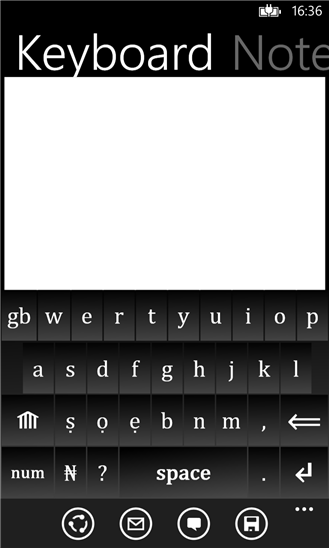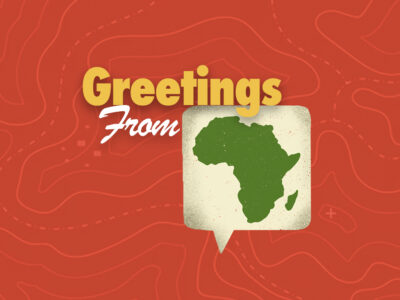Few days ago I was chatting with a good friend of mine on the BlackBerry Messenger platform. We were gisting, like it is commonly said and we were doing so in Nigerian Pidgin. I am not Nigerian but living with a large community of Nigerians, one learnx it. And as we were conversing, I became frustrated by the fact that my phone's autocorrect setting kept ‘correcting’ the interjection ‘na’ to ‘N'a’ or would ‘complete the expression ‘sha’ to shame. So impulsively, I rushed through my language and input settings and as I was asked to select a language, I burst into laughter because I realized I was on a very wild goose chase; pidgin isn't available as a ‘language’ in most, if not all modern electronic platforms.

Screenshot of “Yoruba Keyboard”, a keyboard replacement application for typing in Yorùbá language available on the Windows Phone OS platform. Photo by Nuges Apps under CC BY 2.0.
Then I got to think about it and I asked why? Why is pidgin not available in language settings? According to the Nigerian Communications Commission Subscriber Data, Nigeria has nearly 122 million connected and active phone lines, with 97% being mobile. This makes Nigeria the first in this category in Africa and 9th worldwide. Yet, the most widely spoken tongue in Nigeria is not available in phone input settings.
This is not exclusive to Nigeria however. Around the world, vehicular languages (lingua franca) and dialects which are more widely spoken than the official languages suffer lack of representation in the tech and mobile worlds. Urdu, for example, is the national and vehicular language of Pakistan and an official language in five Indian states. Likewise, several dialects of the Bantu family in Africa, of varying prevalence, do not have support on mobile devices.
Third party language plugins and applications are available to help native speakers feel more comfortable with their smartphones. Some of such projects include Kannada-Hindi Keyboard which allows users to type anything from messages to memos in the kanada and devanagari (marathi/hindi) languages of India and Multiling Keyboard, an Android keyboard application with support for nearly 130 languages. But the developers of these apps often suffer from limited funding and the lack of consumer support which most at times leads to the apps being discontinued.
Are we faced with a global systemic error? Or does the world believe that those languages do not have their place in the advanced technology sector? Let us hope that in the years to come, we'd have an Android or iOS platform which accepts User Interface root customization including keyboard and input settings in Pashto and Igbo languages.



2 comments
It’s a tough one. Personally I believe we need better laws which force tech giants to either support or at least enable our own efforts. Otherwise we’re forever fighting small skirmishes while losing the battle overall – like Basque which somehow managed to get onto Blackberry. Now that Blackberry is going down, back to square one trying to get onboard with the next mobile OS. And we certainly need legal muscle to get around blocks against third party entry methods like you get on iOS and Windows Phone. One the one had they won’t do anything for our languages and at the same time they won’t let us do anything either. To me this all smacks of linguistic fascism.
The speed of development isn’t helping either. We were quite pleased when we managed to do predictive texting for Gaelic, Irish and Manx a couple of years back with a project called Adaptxt. Then what happened? Suddenly everyone is trying to push voice recognition.